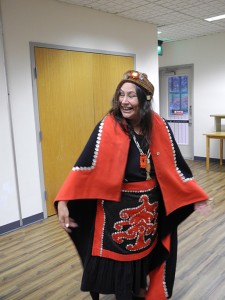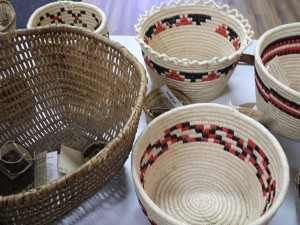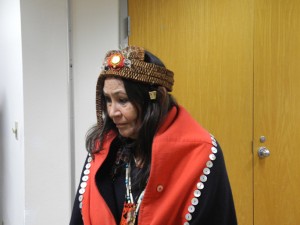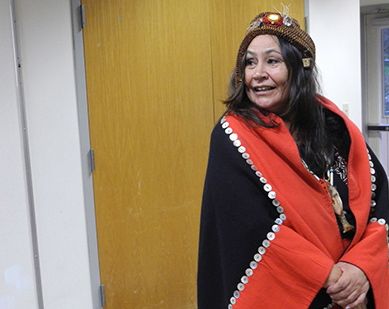By Doris Faltys
 “When I am sharing this very first legend,” Harvest Moon Howell begins, “I am actually seeing how good your ears are.”
“When I am sharing this very first legend,” Harvest Moon Howell begins, “I am actually seeing how good your ears are.”
We are at the Shelton branch of the Timberland Regional Library. Native American story teller, Harvest Moon Howell, is beginning her performance. Harvest continues, “I am telling you this, so if you are going to sit there and be thinking about what you are going to have for dinner tonight, or how to balance your checkbook, well then the next legend won’t be as good. But if your ears become larger, then the story will become a big as your ears.”

Harvest is wearing a long bright red cape trimmed with black. There is a large outline of a sea otter in abalone shell disks sewn onto the back. Harvest tells us about her relationship to the otter. “Sea otter loves to tease and my family’s favorite holiday is April Fools’ Day. Sea otter doesn’t like to stay in one place and we move around a lot. Sea otter has the same color hair as mine. Sea otter loves seafood and I could eat seafood breakfast, lunch, and dinner. Sea otter likes to be where everybody watches.” She pauses to allow us to see that we all are here watching her.
“My apron,” Harvest continues, “has a symbol of a cedar tree.” She points to the abalone disk outline of a tree on the apron skirt. “This image represents my 35 years of making cedar bark baskets.” Harvest Moon is a master basket weaver. She has many of her baskets arranged on a table at the front of the room.
“My headband is made of cedar bark woven in the lanyard technique. It took me two years to learn how to do this type of weaving and about eight hours to make this headband.” Harvest adds, “It has some tiny paddles on it. This is to share that we are from the canoe tribe.” She laughs and adds, “Way better than the horse tribe.”
Her natural speaking voice is full of suggestions, leaving thoughts initiated but unspoken. This manner of speaking is also evident as Harvest tells us about growing up in Olympia. “In the late 60’s it was very common for native children to be adopted by non-native families. I would not be complete if it wasn’t for my parents in Olympia. My German Polish family that loved me and brought me up as a princess with 4H, and church and everything that would be part of that.”
“I believe it was after the birth of my first child. The doctor was asking health related questions about my family background. I thought, now I have to see my birth parents. It turned out, my adoption papers had opened up when I turned 18,” she recalls.

“I found out that my birth mother is Hoh River and my birth father was Quinault. My birth mother had moved to Arizona. My birth father lived in Aberdeen. I had a chance to meet him only three times before he passed away. I did have a chance to find that my birth father gifted me my hand gestures, and my basket weaving,” she adds
“It was at my father’s funeral,” Harvest tells us, “that this lady Hazel Underwood came up and threw a woven basket into my lap. She indicated that I should become a basket maker. I am thinking ‘I’m not making a silly old basket.’ But years later I started taking basket making classes. People ask me how long it takes to make my baskets. I tell them two hours to make one but 35 years to learn the techniques. I always respond 35 years to that question.”
“I came into this world in the middle of the night. It was the night of the full moon and it happened to be a time of year when there had just been a large harvest of salmon. My grandfather knew that my name would be Harvest Moon. But I did not get that name until I was 19,” she says and adds that the meaning of her native name is “a light shining forth in the midst of darkness.”

The pitch, tone, rhythm, and cadence of Harvest Moon’s voice draws listeners in. She sings while shaking a rattle, then the legend of dogs and their tails commences.
“This all began years ago. There was a very prestigious young chief. Whenever he talked, he talked with his heart. Whenever he listened, he listened with his mind, and when anyone was in need, he was there to give. Because of these beautiful characteristics people from all over came to live with him in his long house. And as the years went by the long house became very cramped and crowded. He raised his talking stick and said, ‘Let us work together and we will build the most beautiful long house in the Pacific Northwest.'”
Harvest Moon Howell has been telling stories for 26 years including a term as a speaker on the Washington State Commission for the Humanities. She is a Quinault Tribal Ambassador and a Master Basket Weaver.
Join Harvest for a storytelling experience of, “Old and New Legends of the Pacific Northwest,” November 16 at 1:00 p.m. at the The State Capital Museum in Olympia. She will also be part of the Folk Art Ornament class held at the Capital Museum on November 30 from 12:00 – 3 p.m.




















































